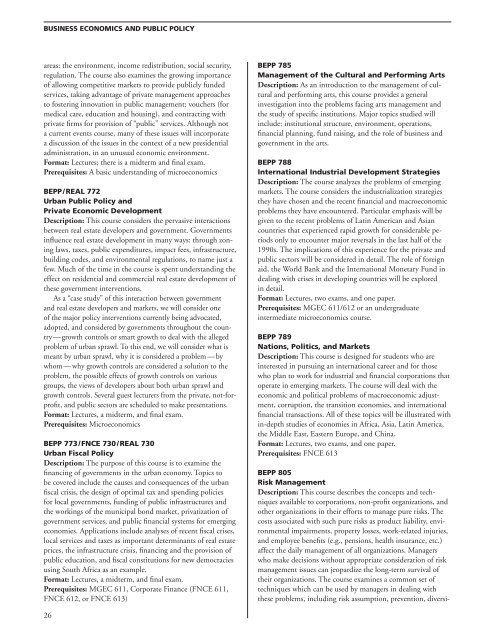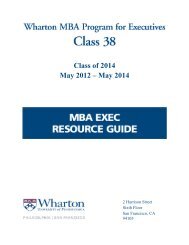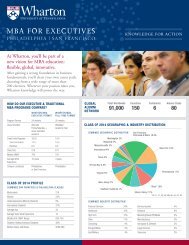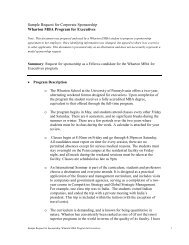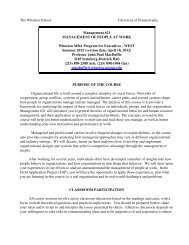Explore Options; Plan Your MBA Academic Program
Explore Options; Plan Your MBA Academic Program
Explore Options; Plan Your MBA Academic Program
Create successful ePaper yourself
Turn your PDF publications into a flip-book with our unique Google optimized e-Paper software.
BUSINESS ECONOMICS AND PUBLIC POLICY<br />
areas: the environment, income redistribution, social security,<br />
regulation . The course also examines the growing importance<br />
of allowing competitive markets to provide publicly funded<br />
services, taking advantage of private management approaches<br />
to fostering innovation in public management: vouchers (for<br />
medical care, education and housing), and contracting with<br />
private firms for provision of “public” services . Although not<br />
a current events course, many of these issues will incorporate<br />
a discussion of the issues in the context of a new presidential<br />
administration, in an unusual economic environment .<br />
Format: Lectures; there is a midterm and final exam .<br />
Prerequisites: A basic understanding of microeconomics<br />
BEPP / REAL 772<br />
Urban Public Policy and<br />
Private Economic Development<br />
Description: This course considers the pervasive interactions<br />
between real estate developers and government . Governments<br />
influence real estate development in many ways: through zoning<br />
laws, taxes, public expenditures, impact fees, infrastructure,<br />
building codes, and environmental regulations, to name just a<br />
few . Much of the time in the course is spent understanding the<br />
effect on residential and commercial real estate development of<br />
these government interventions .<br />
As a “case study” of this interaction between government<br />
and real estate developers and markets, we will consider one<br />
of the major policy interventions currently being advocated,<br />
adopted, and considered by governments throughout the country<br />
— growth controls or smart growth to deal with the alleged<br />
problem of urban sprawl . To this end, we will consider what is<br />
meant by urban sprawl, why it is considered a problem — by<br />
whom — why growth controls are considered a solution to the<br />
problem, the possible effects of growth controls on various<br />
groups, the views of developers about both urban sprawl and<br />
growth controls . Several guest lecturers from the private, not-forprofit,<br />
and public sectors are scheduled to make presentations .<br />
Format: Lectures, a midterm, and final exam .<br />
Prerequisites: Microeconomics<br />
BEPP 773 / FNCE 730 / REAL 730<br />
Urban Fiscal Policy<br />
Description: The purpose of this course is to examine the<br />
financing of governments in the urban economy . Topics to<br />
be covered include the causes and consequences of the urban<br />
fiscal crisis, the design of optimal tax and spending policies<br />
for local governments, funding of public infrastructures and<br />
the workings of the municipal bond market, privatization of<br />
government services, and public financial systems for emerging<br />
economies . Applications include analyses of recent fiscal crises,<br />
local services and taxes as important determinants of real estate<br />
prices, the infrastructure crisis, financing and the provision of<br />
public education, and fiscal constitutions for new democracies<br />
using South Africa as an example .<br />
Format: Lectures, a midterm, and final exam .<br />
Prerequisites: MGEC 611, Corporate Finance (FNCE 611,<br />
FNCE 612, or FNCE 613)<br />
26<br />
BEPP 785<br />
Management of the Cultural and Performing Arts<br />
Description: As an introduction to the management of cultural<br />
and performing arts, this course provides a general<br />
investigation into the problems facing arts management and<br />
the study of specific institutions . Major topics studied will<br />
include: institutional structure, environment, operations,<br />
financial planning, fund raising, and the role of business and<br />
government in the arts .<br />
BEPP 788<br />
International Industrial Development Strategies<br />
Description: The course analyzes the problems of emerging<br />
markets . The course considers the industrialization strategies<br />
they have chosen and the recent financial and macroeconomic<br />
problems they have encountered . Particular emphasis will be<br />
given to the recent problems of Latin American and Asian<br />
countries that experienced rapid growth for considerable periods<br />
only to encounter major reversals in the last half of the<br />
1990s . The implications of this experience for the private and<br />
public sectors will be considered in detail . The role of foreign<br />
aid, the World Bank and the International Monetary Fund in<br />
dealing with crises in developing countries will be explored<br />
in detail .<br />
Format: Lectures, two exams, and one paper .<br />
Prerequisites: MGEC 611/612 or an undergraduate<br />
intermediate microeconomics course .<br />
BEPP 789<br />
Nations, Politics, and Markets<br />
Description: This course is designed for students who are<br />
interested in pursuing an international career and for those<br />
who plan to work for industrial and financial corporations that<br />
operate in emerging markets . The course will deal with the<br />
economic and political problems of macroeconomic adjustment,<br />
corruption, the transition economies, and international<br />
financial transactions . All of these topics will be illustrated with<br />
in-depth studies of economies in Africa, Asia, Latin America,<br />
the Middle East, Eastern Europe, and China .<br />
Format: Lectures, two exams, and one paper .<br />
Prerequisites: FNCE 613<br />
BEPP 805<br />
Risk Management<br />
Description: This course describes the concepts and techniques<br />
available to corporations, non-profit organizations, and<br />
other organizations in their efforts to manage pure risks . The<br />
costs associated with such pure risks as product liability, environmental<br />
impairments, property losses, work-related injuries,<br />
and employee benefits (e .g ., pensions, health insurance, etc .)<br />
affect the daily management of all organizations . Managers<br />
who make decisions without appropriate consideration of risk<br />
management issues can jeopardize the long-term survival of<br />
their organizations . The course examines a common set of<br />
techniques which can be used by managers in dealing with<br />
these problems, including risk assumption, prevention, diversi-


